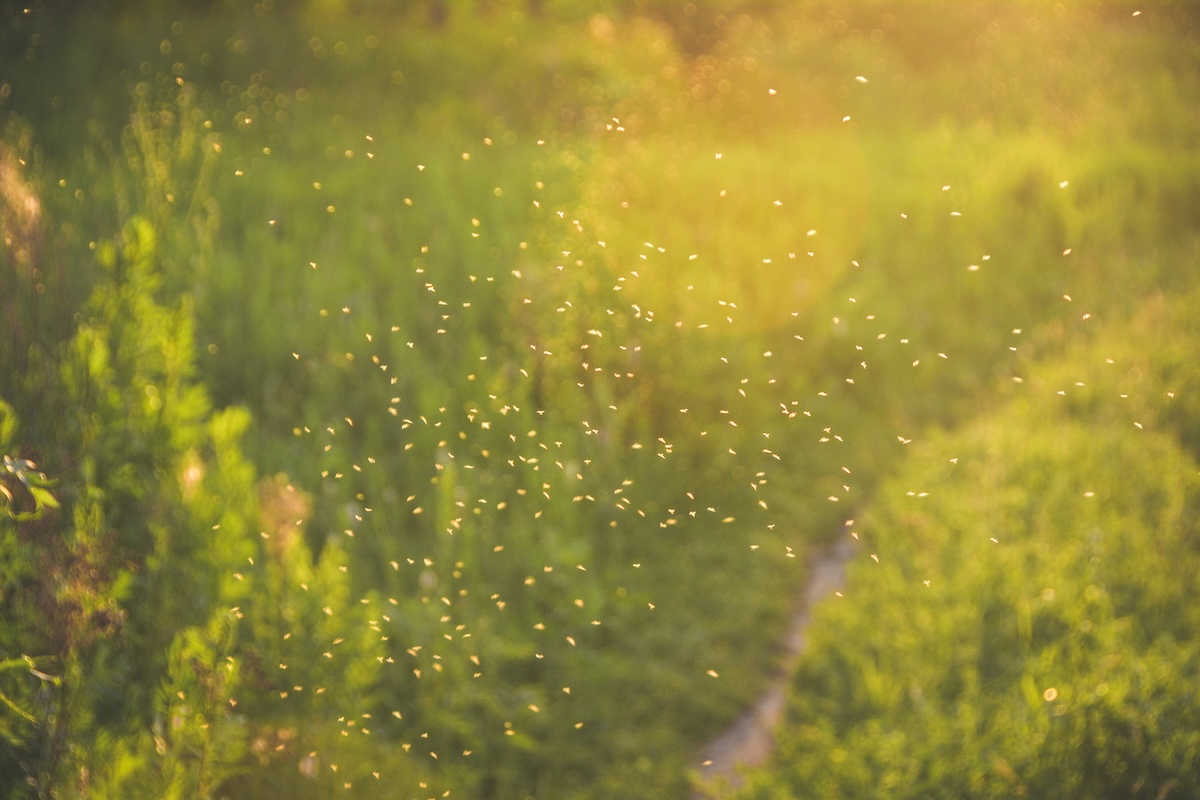

We may earn revenue from the products available on this page and participate in affiliate programs. Learn More ›
No matter where you live, it’s likely you’ll encounter mosquitoes when temperatures rise. Mosquitoes tend to flock to warm, wet conditions, and standing water offers a breeding ground for these pesky insects. Beyond their annoying buzzing and the itchy bites they leave behind, mosquitoes can pose serious health risks, so it’s essential to know how to get rid of mosquitoes when they won’t leave your property.
Luckily, you can apply a range of tactics to both prevent mosquitoes from infesting the yard and keep them from returning. If you’re wary of using commercial chemical prevention methods, opt for natural repellents and prevention steps outside so you don’t need mosquito spray for the house to eliminate the bugs. The following guide has tips for how to deter mosquitoes.
Before You Begin
Although it might be tempting to start lighting citronella candles and planting lavender, it helps to properly identify mosquitoes as your insect problem (vs. crane flies or midges) and determine what level of mosquito infestation is present. This is the first step in learning how to repel mosquitoes and coming up with a mosquito solution.
Adult mosquitoes have one pair of wings, a humped back, a long biting organ that protrudes from their head, and scales on the wings’ veins. In contrast, crane flies have straighter abdomens with wings that rest farther away from their bodies, while non-biting midges lack the mosquito’s distinctive long mouthpart.

Signs of a Mosquito Infestation
Once you’ve confirmed that mosquitoes are present, the next step is to look for signs of a mosquito infestation; an occasional mosquito doesn’t necessarily mean you’re facing a full-blown infestation. Some common indicators that the bugs have infested your yard include a constant buzzing sound, spotting mosquitoes during the daytime and at night, frequent mosquito bites, and mosquitoes in shaded areas of the yard.
Why Mosquito Infestations Are Harmful
Getting rid of mosquitoes is about more than itchy bites or that high-pitched buzz in your ear. Their bites can lead to complications, including infection with mosquito-borne illnesses. In addition, it’s usually both safer and more effective to prevent and control large numbers of mosquitoes than to use personal mosquito repellents as a bite-prevention strategy. Consider these safety issues:
- Mosquitoes can carry more than 15 parasites and viruses, including Zika and West Nile.
- Zika causes a relatively mild reaction in most people, but it is especially risky for pregnant women and can lead to birth defects, miscarriages, and stillbirths, and there is no vaccine for the virus.
- No vaccines are available for West Nile virus, which, while rare, is the most common mosquito-borne virus in the United States. It can lead to conditions such as meningitis or encephalitis, which involve swelling in the brain or spinal cord.
Why Using Natural Mosquito Removal Methods Is Important
Getting rid of large populations of mosquitoes can be as simple as eliminating standing water around your home. Staying vigilant to this and other prevention and control methods can eliminate the need for methods that also can kill beneficial insects or even add to pollution in waterways.
Pollinators such as bees, butterflies, and birds play an important role in balancing the ecosystem by spreading pollen grains to help plants fruit and seed. Try the least harmful methods first and use chemical solutions only if necessary.
How to Get Rid of Mosquitoes
In most cases, prevention of mosquito breeding and taking steps to protect your skin from bites can keep mosquitoes from becoming a problem. If you see signs of an infestation, try the least harmful approaches first for how to get rid of mosquitoes outside.
Prevent mosquitoes by eliminating standing water.
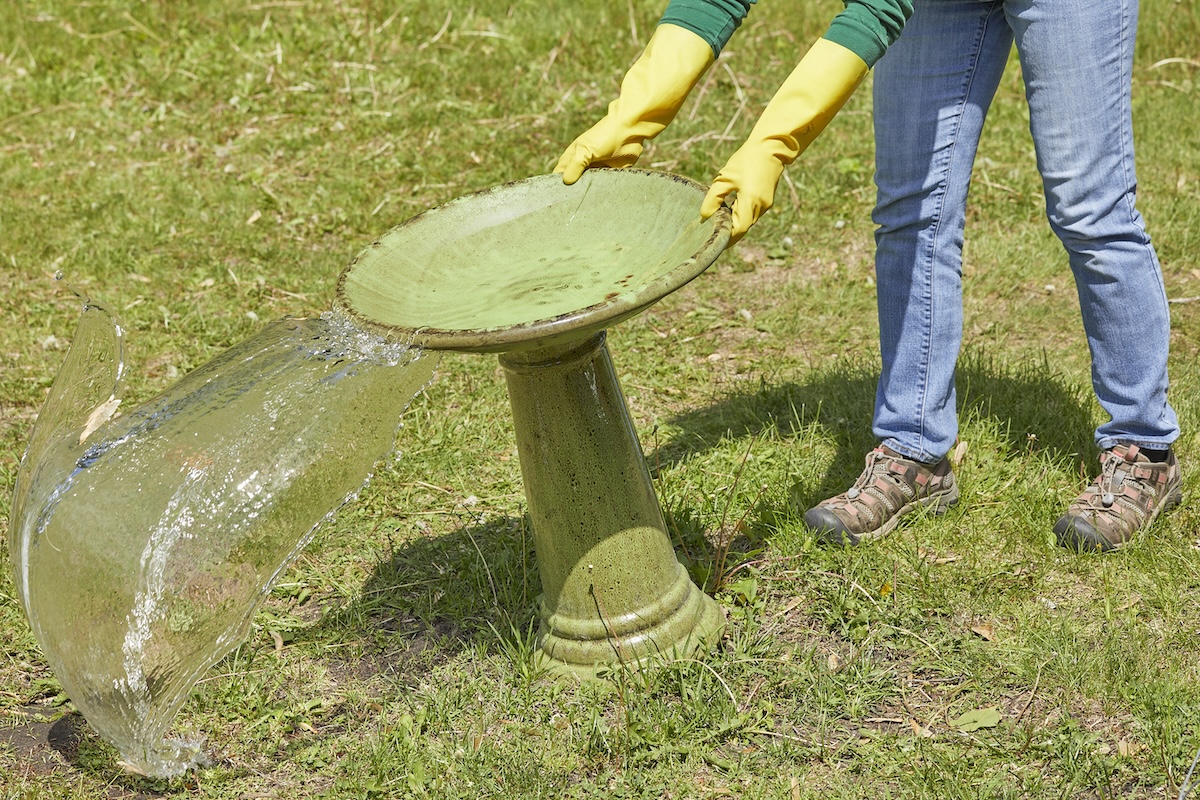
Mosquitoes like to lay eggs in water with little to no flow, which is why standing water outside your home can lead to an infestation. It doesn’t have to be a still pond; standing water can include a small puddle, or water inside an outdoor toy, birdbath, trash container, or inflatable pool. When figuring out how to get rid of mosquitoes in the backyard, your first step is to watch for and pour out standing water on a regular basis to prevent mosquitoes from breeding near your home.
About once a week (and after rain when possible), walk through the yard and patio. Empty any items holding water or cover containers without lids to prevent egg laying. Cover open vents or plumbing pipes with wire mesh that has holes small enough to keep adult mosquitoes from getting through. It also helps to repair any cracks or gaps in the septic tank.
Clean the gutters regularly.
Gutters also can be a breeding ground for mosquitoes. When they are cluttered with debris, leaves, or residual water from recent storms, gutters can attract mosquitoes and lead to an infestation. Cleaning the gutters regularly or hiring a gutter-cleaning service can lessen the risk of inviting mosquitoes near the property. In some cases, this can be what makes mosquitoes go away.
Maintain the lawn with regular care and cleanup.
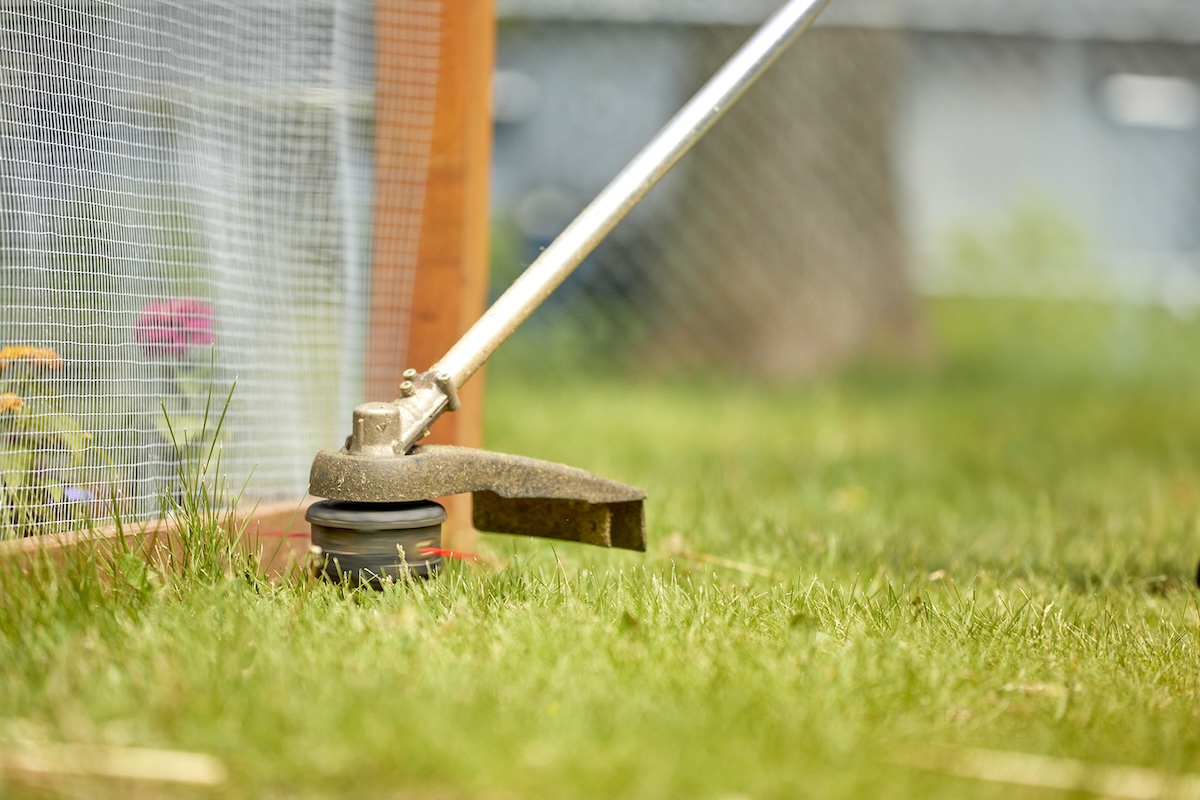
Mosquitoes are drawn to cool, dark, damp places, and overgrown lawns can provide all three. Regular lawn maintenance such as mowing and trimming keeps adult mosquitoes from nesting and allows standing water to dry more quickly from sun exposure. The better you maintain the grass, the less likely you will be to create another breeding ground for mosquitoes, which can multiply their population easily.
It’s also wise to keep bushes trimmed and clean up yard waste. Additionally, consider using cedar mulch in garden beds, as the cedar oils can help repel mosquitoes and the mulch can absorb excess moisture.
Add natural repellents to deter mosquitoes.
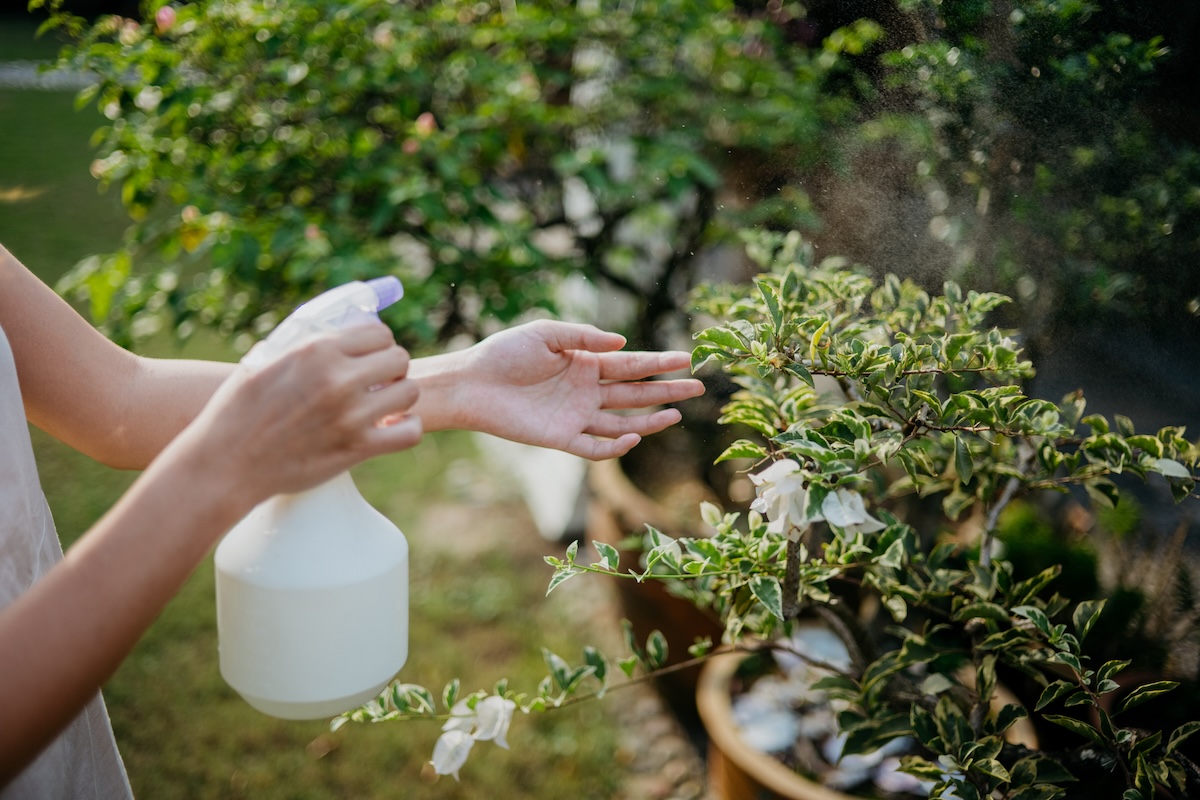
There are plenty of home remedies to get rid of mosquitoes for those who are wary of applying harsh chemicals or solutions that are dangerous to children or pets but are trying to figure out how to control mosquitoes. The following options are natural ways to get rid of mosquitoes:
- Plant herbs and flowers: Lemongrass, basil, lavender, and peppermint are among several plants and herbs that act as natural mosquito repellents due to their strong scents. Flowers such as marigolds or lantanas can also help deter mosquitoes. Planting these around the perimeter of your patio or home can help control a mosquito population and keep the insects from coming inside.
- Welcome natural predators: Bats are one of mosquitoes’ most feared predators and can swallow up to 1,000 mosquitoes per hour. If you live in a temperate climate that attracts bats, you can make your yard more welcoming by building a bat house, painting the interior dark, and placing it somewhere that gets at least 6 hours of sunlight a day. Ideally, place bat houses at a height of 12 to 20 feet off the ground. In addition, keep bat houses 20 to 25 feet away from any tree branches.
Wear insect repellent and clothes that cover the skin.
When outdoors during peak mosquito activity, wear long sleeves and pants to give mosquitoes less skin surface to bite. You also can prevent mosquito bites by applying a commercial or homemade mosquito repellent. The most effective EPA-approved ingredients to look for in an insect repellent are:
- DEET
- Picaridin
- IR3535
- Oil of lemon eucalyptus (OLE)
- Para-menthane-diol (PMD)
- 2-Undecanone
Always spray according to directions and avoid spraying children’s hands. Apply products with low percentages of DEET sparingly, and always follow package directions for use on children and adults.
Use fans, candles, and other deterrents.
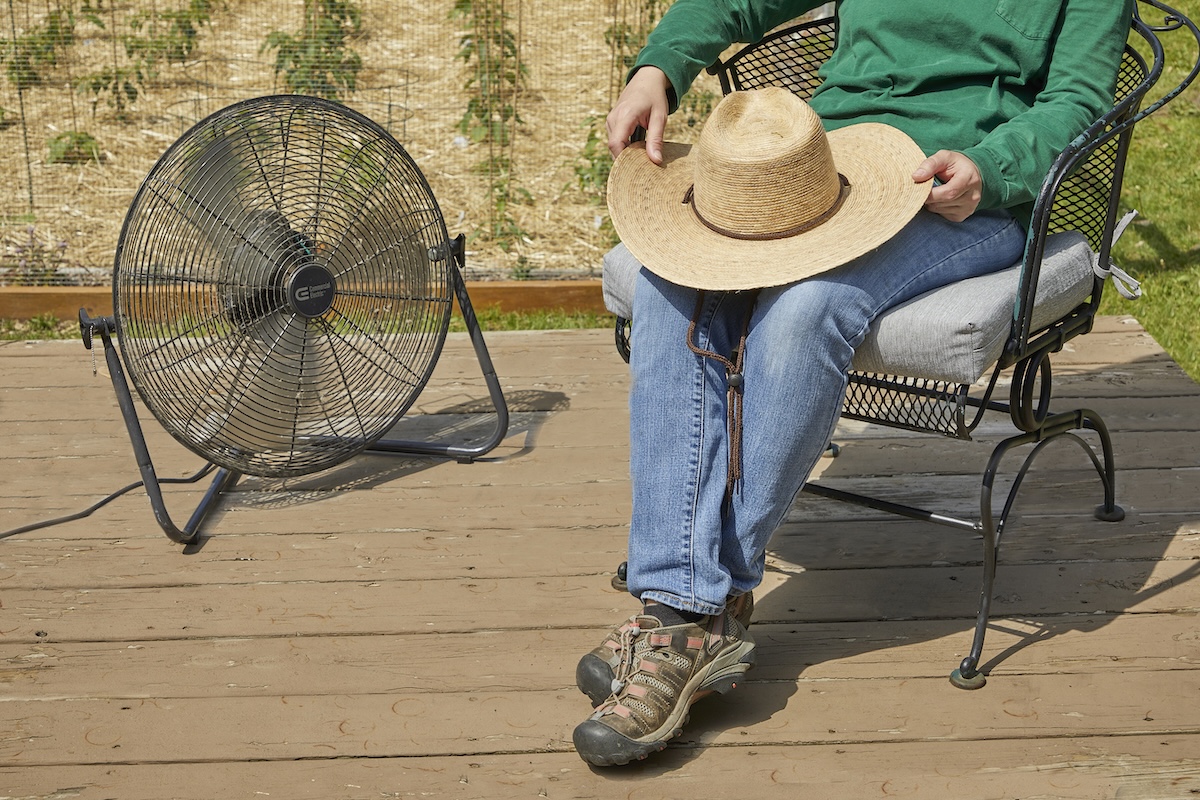
Once you address a large mosquito problem outdoors, even occasional mosquitoes can be a nuisance when enjoying your outdoor spaces. Try these chemical-free approaches to deterring mosquitoes.
- Use fans: A steady stream of air can keep mosquitoes away. When faced with a strong force of wind, mosquitoes can’t effectively navigate and will likely steer clear of the area. Try installing an outdoor fan on your patio if you have outdoor mosquitoes; an indoor fan will also help keep mosquitoes away indoors.
- Light citronella candles: The oil from a lit citronella candle evaporates into the air and masks the human scents (such as carbon dioxide) that attract mosquitoes.
- Burn coffee grounds: A great way to reuse old coffee grounds is to burn them. Like citronella candles, burned coffee grounds produce a strong odor that masks the smell of humans and repels mosquitoes. You can place the grounds in a bowl outdoors and light them as you would light incense.
- DIY a mosquito egg killer: If you have areas that collect water (but don’t support fish or other wildlife), you can pour some dish soap or shampoos in. Olive oil or vegetable oil also get rid of eggs, but avoid using oils in places where fish live or in bird baths.
Repel and stop mosquitoes with commercial products.
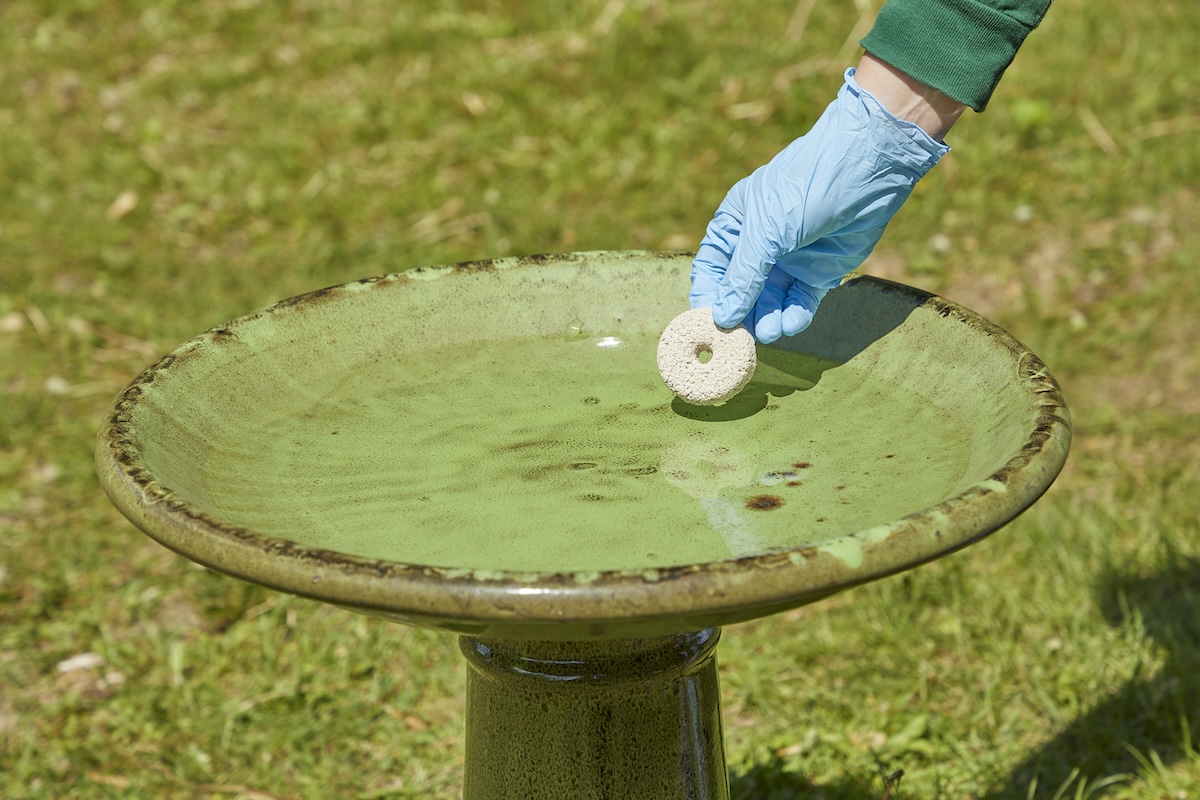
When natural methods won’t cut it, you can try to ward off mosquitoes with pesticides or traps containing chemicals. Commercial products might contain ingredients such as prallethrin, etofenprox, pyrethrins, permethrin, resmethrin, and sumithrin.
- Spray chemicals: Spraying your yard or garden as directed by a product can kill mosquitoes on contact. Sprays may come in concentrated or premixed forms. Always use caution when handling these chemicals and carefully follow all application and safety instructions on packaging.
- Add egg killers to standing water: Water-soluble tablets or packets can kill mosquito eggs in stagnant water if you have spots that collect rain or other water often, such as bird baths, gutters, and ornamental ponds. The larvicide in them is not safe if it runs off to storm drains or waterways.
- Hang mosquito traps: Today’s mosquito traps can come in the form of UV lights and wall-mounted sconces. Some produce a high-voltage shock that kills mosquitoes on contact, while others are more compact and portable to use on the go or while camping.
- Use a bug zapper: The light from bug zappers as well as the chemicals they emit helps attract and kill mosquitoes around the home. These tools range in price from $20 for handheld versions to $65 for more high-tech options.
Follow all safety precautions with these products. Be aware that many mosquito traps and bug zappers can trap or kill beneficial insects. When using commercial pesticides or repellents, it’s best to read the warning labels beforehand or get help from a professional. Some ingredients are particularly unsafe for children, pets, or pregnant women.

Hire a mosquito control company to get the job done effectively and keep mosquitoes from returning.
Sometimes your DIY measures still fail to eliminate mosquitoes, which means it’s probably time to get on a professional pest control plan like Sunday pest control. Getting custom help is especially important if you live in a region with high humidity where mosquitoes often run rampant and are harder to control.
Sunday’s mosquito control experts come up with a treatment plan that’s tailored to your specific mosquito problem after you answer questions about your needs and location. The company will ship you a year’s worth of the plan’s recommended products, along with step-by-step instructions and timing so you can apply the pest control products yourself.
Final Thoughts
Mosquitoes are more than a nuisance; their bites can cause discomfort and even infections with viruses or parasites. Protect yourself and your family from mosquitoes by first making your property unfriendly to their breeding and gathering, while considering the safety of beneficial pollinators. Always use caution when applying mosquito-killing pesticides or repellents and follow the provided instructions.
FAQs
Yes. Anything from blood type, sweat, beer consumption, and pregnancy can make some people more attractive to mosquitoes than others. Around 20 percent of people are more attractive to mosquitoes than the rest.
Mosquitoes seem to like Type O blood the most and Type A blood the least. Additionally, 85 percent of people secrete biochemical markers through their skin that identifies their blood type, while 15 percent do not. Mosquitoes will be more attracted to the secretors, regardless of their blood type.
Mosquitoes hate the smells of lavender, tea tree oil, citronella, and lemon eucalyptus.
According to the Centers for Disease Control and Prevention (CDC), washing the bite with soap and water, applying an ice pack, and applying a paste of baking soda and water can help treat mosquito bites.
Yes, if the material is thin or tight-fitting enough, mosquitoes can bite through clothes.
Some mosquitoes are active throughout the day. Because direct sunlight can dehydrate them, most mosquitoes are most active in the early morning hours before temperatures rise and in the late afternoon or early evening just before sunset.
Professional mosquito control typically costs between $350 to $550 per season. Using a customized kit with the appropriate products you apply yourself can save a few hundred dollars. DIY solutions, like homemade mosquito spray, cost a few dollars.
You can follow the above suggestions to kill and repel mosquitoes. If mosquitoes are getting into the house at night while you sleep, a fan pointed at the bed can keep them from landing. Additionally, you can avoid strong-scented body products that might attract mosquitoes.
The average adult mosquito lifespan is 2 to 3 weeks. Females typically live longer than males.
Female mosquitoes bite humans and feed on blood. Male mosquitoes feed on flower nectar and do not bite humans.
